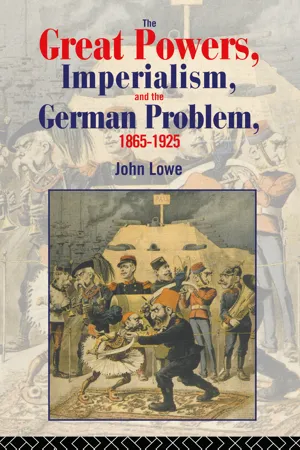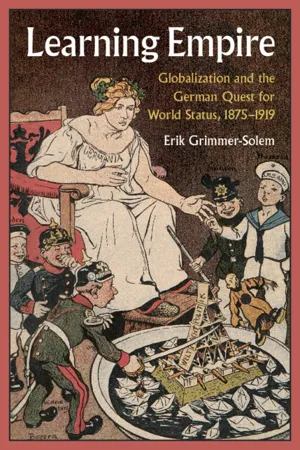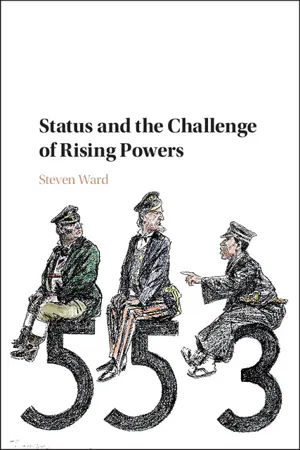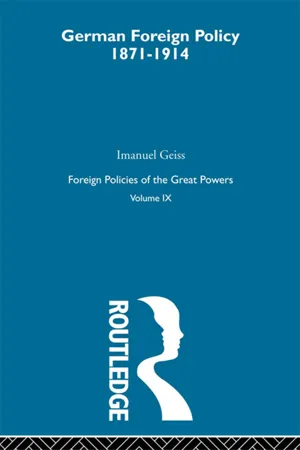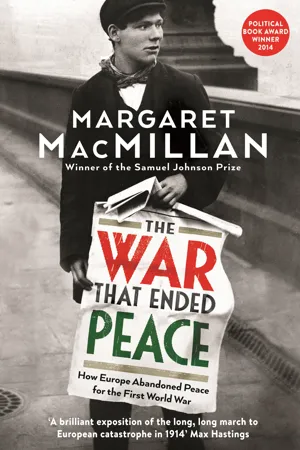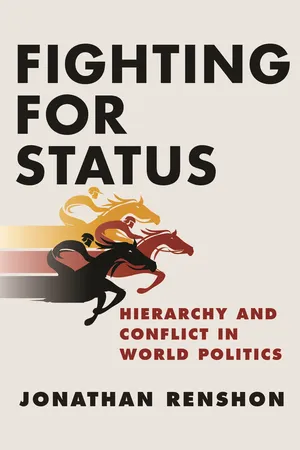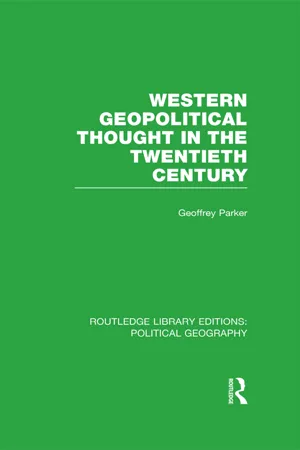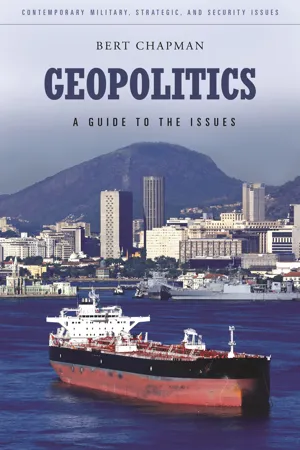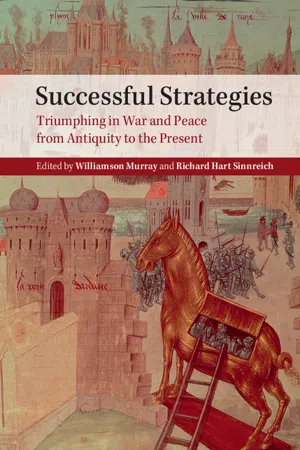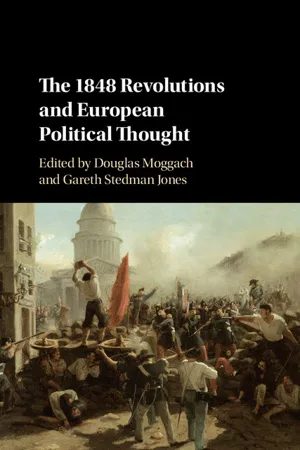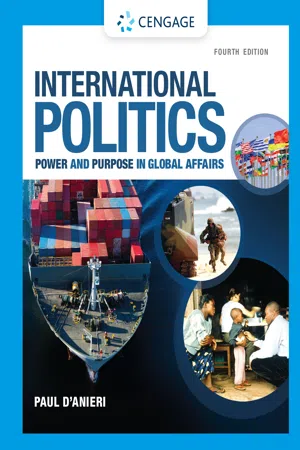History
Weltpolitik
"Weltpolitik" was a term used in late 19th and early 20th century Germany to describe the country's pursuit of a global policy and its desire for a prominent role in world affairs. Coined by German Chancellor Bernhard von Bülow, it reflected Germany's aspirations for colonial expansion and a more assertive foreign policy. This approach contributed to the tensions that ultimately led to World War I.
Written by Perlego with AI-assistance
Related key terms
1 of 5
11 Key excerpts on "Weltpolitik"
- John Lowe(Author)
- 2013(Publication Date)
- Routledge(Publisher)
Furthermore, Weltpolitik was the logical form for this expansion to take since a European great power, anxious to pursue great power politics in this era, necessarily had to embark on a world power policy. But, in contrast to the Fischer school, Schöllgen finds little evidence of a rigorous concept or well-formulated objective behind Bülow’s pursuit of Weltpolitik from 1897 to 1909. For Bülow, world policy seems to have meant little more than an assertion of Germany’s right to ‘a place in the sun’ or ‘the right to equality with other great nations’. Weltpolitik may therefore have represented a general desire to ‘catch up’ with the other great powers in imperialist activity, something that had been neglected by Germany’s leaders for a decade after 1886. However, the lack of planning and the divergence of views among Bülow, Holstein, Tirpitz and the Kaiser resulted in fumbling around all over the world. As a consequence, Germany’s sudden intrusion into Asia, Africa or the Middle East tended to bewilder the other powers, who ascribed sinister motives to Germany’s unexpected behaviour. In this sense Geiss’s recent characterization of Weltpolitik as ‘the most explosive version of modern imperialism’ seems very apt. That Germany had little choice but to expand overseas in order to demonstrate its status as a great power seems evident enough. This still left Germany’s leaders with some options. Despite the complications arising from a conflict between ideology and economic interest, they could still choose between cooperation with another great power (either Russia or Britain) and the policy of the ‘free hand’, the policy which Bülow actually adopted, which risked alienating most of the other powers- eBook - PDF
Learning Empire
Globalization and the German Quest for World Status, 1875–1919
- Erik Grimmer-Solem(Author)
- 2019(Publication Date)
- Cambridge University Press(Publisher)
Was Weltpolitik just “the old policy of the free hand with a larger navy and more menacing mood music,” as Christopher 54 Klaus Hildebrand, “Zwischen Allianz und Antagonismus: Das Problem bilateraler Nor- malität in den britisch-deutschen Beziehungen des 19. Jahrbunderts (1870–1914),” in Weltpolitik, Europagedanke, Regionalismus: Festschrift für Heinz Grollwitzer zum 65. Geburtstag am 30. Januar 1982, ed. Heinz Dollinger, Horst Gründer and Alwin Hansch- midt (Münster: Aschedorff, 1982), 305–31, here 325; Schöllgen, Imperialismus und Gleichgewicht, 435–36. 55 See Imanuel Geiss, Der lange Weg in die Katastrophe: Die Vorgeschichte des Ersten Weltkriegs, 1815–1914 (Munich: Piper, 1990), 116–41, 204–27. 56 Schöllgen, Imperialismus und Gleichgewicht, 441. 57 Wehler, Gesellschaftsgeschichte, vol. 3, 1139. Clark has pithily put it? 58 Perhaps from the hindsight of its extremely modest achievements by 1909, but like Wehler’s perspective this risks downplaying or overlooking the novel involvement of the educated bourgeoisie in identifying and analyzing Weltwirtschaft and in defining the aims of Weltpolitik. In 1897 the mood was ebullient, the horizons appeared wide, and confidence in Germany’s capacities ran high, even if fears always nagged that Germany might have started too late, that jealous competitors were bent on hindering it, and that Germany might come up short again. That overconfidence was shared by the generation of government men coming into positions of power and influence in these years, such as Alfred Tirpitz and Bernhard von Bülow, part of a generation that had experienced the unification of Germany in their early adulthoods and then the breathtaking industrial development of the country. Having experienced these developments, they believed in progress and were prone to see a future full of opportunity and to overlook the always lurking danger of German isolation. - eBook - PDF
- Steven Ward(Author)
- 2017(Publication Date)
- Cambridge University Press(Publisher)
Germany would now seek to become a world power by securing colonial possessions and building a blue-water navy composed of state-of-the-art battleships (an effort known as Flottenpolitik). Twelve decades later, there remain significant questions about what Germany was after as it pursued Weltpolitik. Realists argue that it was wealth, power, and security, but this is unconvincing. 18 Germany’s 17 Fischer (1961, 1969) was the first to emphasize the drive for “world power” status in German foreign policy. See also Strachan (2001), Chapter 1; MacMillan (2013), Chapter 4; Röhl (2001, 2014); and Hull (2015). Among political scientists, see Larson and Shevchenko (2014a, p. 39); Murray (2010, 2016); Wolf (2014), Fikenscher, Jaschob, and Wolf (2015); and Renshon (2017), Chapter 6. 18 Copeland (2000), p. 76; and Mearsheimer (2001), p. 188. Renshon (2017), Chapter 6, has recently asserted that Weltpolitik is actually best understood as an effort to increase Germany’s position in the world (including its material position) via the achievement of improved status. Status, on this view, induces deference, which means that it is instru- mentally useful and thus may be expected to yield long-term material benefits. This, in essence, is a more complicated, better-specified version of the arguments of Copeland and Mearsheimer. More specifically, Renshon interprets the two Morocco crises as successful efforts at improving German status (pp. 199–206), and defends the obsession with battleship building as a nearly successful effort to coerce London into granting Germany coequal status (pp. 206–216). - eBook - ePub
- Geiss, Imanuel Geiss(Authors)
- 2013(Publication Date)
- Routledge(Publisher)
Part three
‘Weltpolitik’ AND NO WAR-1896-1912
Passage contains an image
Chapter 8
THE EMERGENCE OP ‘Weltpolitik’, PROM DOMESTIC POLICY, 1896-8
By 18 January 1896 Germany had not yet become a world Empire, but it was crossing the threshold to ‘Weltpolitik’. Although some German leaders immediately saw and accepted the risk of war as a consequence of ‘Weltpolitik’, (1 ) others fostered the illusion that war could be avoided. Just before the First World War it was a group of liberals around Chancellor Bethmann Hollweg who believed in the chances of ‘Weltpolitik’ and no war. (2 ) In 1913 historical events appeared to justify their optimism, because in spite of the many crises and war scares, peace between the Great Powers of Europe had not been shattered - yet. In 1913, however, basic decisions on war or peace had already been taken behind the scenes in Germany, (3 ) and important factors that made for war outside Germany were in action. (4 ) The years between the emergence of ‘Weltpolitik’ and the basic decision in Germany to go to war - for without war ‘Weltpolitik’ would have been a failure - may be seen as another period in the history of German foreign policy between the wars of 1870-1 to 1914-18.ECONOMIC AND DOMESTIC REASONS FOR ‘Weltpolitik’
In 1896-7 one important precondition of German ‘Weltpolitik’ had become reality: the Great Depression had been overcome and had given way to a long-term period of prosperity which lasted until 1914. German export industry, favoured by Caprivi's policy of commercial treaties, entered a period of breathtaking expansion. Within less than two decades German industry succeeded in overtaking Britain in key sectors of modern economy - mining and steel production - and took the lead in new sectors - chemical and electrical industries. (5 - eBook - ePub
The War that Ended Peace
How Europe abandoned peace for the First World War
- Margaret MacMillan(Author)
- 2013(Publication Date)
- Profile Books(Publisher)
Weltmachtstellung , or ‘world power’.The terms reflected the widespread notion among patriotic Germans that the country’s remarkable economic progress, the rapid spread of German investment and trade around the world, and Germany’s advances in such areas as science ought to be matched by an increase in its standing in the world. Other nations must recognise Germany’s achievements and its changed position. For liberals this meant Germany providing moral leadership. As one of them wrote wistfully from the vantage point of the 1940s: ‘My thoughts always wander back to the time when [we] co-operated in that fine effort: work for Greater Germany, peaceful expansion and cultural activities in the Near East … A peaceful Germany, great, honoured and respected.’25 For right-wing nationalists, though, and that included the Kaiser and his closest advisers as well as the numerous members of patriotic societies, it meant rather political and military power and, if necessary, a struggle against other powers.In those years while the new Kaiser and Germany were feeling their strength, an elderly history professor was attracting packed audiences at his lectures at the University of Berlin. Heinrich von Treitschke was one of the intellectual fathers of the new German nationalism with its longing for a place in the sun. Through his lectures and writings, which included a very popular multi-volume history of Germany, he influenced a whole generation of Germany’s leaders to take pride in the great German past and in the extraordinary achievements of Prussia and the Prussian army in building the German state. For Treitschke patriotism was the highest of all values and war was not only a necessary part of human history but a noble and elevating one. If only Germany seized its opportunities, it would rise, as it deserved, to world dominance.26 He was, said Bülow, whose favourite writer he was, the ‘prophet of the national idea’.27 When Helmuth von Moltke, the future chief of the German general staff, read Treitschke’s history as a young man he was ‘captivated’ and wrote later to his wife that ‘a spirit of patriotism and love of the German Fatherland drifts through the whole work, without violating historical truth; it is superb’.28 The Kaiser was surprisingly lukewarm; although he liked the general drift of Treitschke’s writings, the historian did not praise the Hohenzollerns highly enough.29 - eBook - ePub
Fighting for Status
Hierarchy and Conflict in World Politics
- Jonathan Renshon(Author)
- 2017(Publication Date)
- Princeton University Press(Publisher)
Colonies and a larger naval fleet were always perceived by leaders as a means of achieving their goals rather than being goals themselves. These policies are thus better thought of as a reflection of the true goals of German Weltpolitik, not its core. In fact, Mommsen argues that “German ‘world politics’ was not concerned with concrete territorial acquisitions at all, but only with the prestige associated with Imperial Germany’s participation in all affairs concerning its overseas empire.” 30 In this, the German belief that colonies would bring increased international standing was typical of the time period. A French statesperson at the turn of the century remarked, “To remain a great nation, or to become one, you must colonize.” 31 One potential concern in these descriptions of Weltpolitik is that we might be overlooking potentially important variation among Germany’s leadership. After all, while Wilhelm was the ultimate authority, he had plenty of advisers whose disagreement on other issues is by now well known. Yet on the larger issues of motivations and goals—of what German leaders wanted —there was little disagreement. Kennedy nicely sums up this agreement by noting that an “ideological consensus” for Weltpolitik existed: “not that it was a unanimously accepted programme, but that the pursuit of a greater German role in world affairs was regarded as both understandable and desirable by virtually all who had an influence upon external policy.” 32 Thus, the important differences (such as disagreement on what kind of navy to build and for what purpose) were in general on how best to achieve the ends that most everybody agreed to be the ultimate goal: a greater role in world affairs and improved standing in the international system. 33 The Roots of German Status Dissatisfaction Of course, desiring status would have not distinguished Germans from any other state in the nineteenth century - eBook - ePub
- Geoffrey Parker(Author)
- 2014(Publication Date)
- Routledge(Publisher)
Geopolitik which developed in the 1920s had a far more rational approach to the achievement of national fulfilment. From the beginning it was in the business of both explanation and prescription. There was the explanation of how the disaster had ever been allowed to take place at all, and the prescription for how Germany could once again be restored to her rightful place in Europe. The study of spatial reality was to be used to shed light on the German predicament and spatial remedies were to be administered to the sickly, but soon remarkably co-operative, patient.It was in Munich that Geopolitik originated and developed in the years after World War I, and it was always especially associated with this city although it later came to be studied at many German universities. Weigert commented on the particularly intense atmosphere in those years and pointed out that ‘Munich had always been the intellectual cauldron in which fantastic and mysterious German concoctions were brewed’.12 Spengler, Hitler and Haushofer all lived and worked in this city which was also the home of German National Socialism.The central figure in German Geopolitik was Professor Karl Haushofer (1869–1946), the son of a Bavarian schoolmaster who rose to the rank of Major-General in the Imperial army. He travelled widely and cultivated a lifelong interest in the Far East and especially in Japan. This latter country was to recur over the years as one of his most favoured geopolitical models. Like Kjellén before him, he became increasingly absorbed in the relationship between geography and political activity and was convinced that the location and territorial characteristics of states were the principal determinants of their destiny. He was instrumental in establishing the Institut für Geopolitik in Munich, and in 1924 became the first editor of its journal, Zeitschrift für Geopolitik. Subsequently Facts in Review, published in English, was to inform students in the Anglo-Saxon countries of the kind of geopolitical ideas which were emanating from Munich. This was, of course, largely propaganda which attempted to put Geopolitik in the best possible light for overseas consumption. The Munich institute soon became the recognised centre for the study of the subject and Karl Haushofer remained its principal exponent. His son Albrecht, a friend of Rudolf Hess, also became a geopolitician, and appears to have helped introduce Geopolitik - eBook - PDF
Geopolitics
A Guide to the Issues
- Bert Chapman(Author)
- 2011(Publication Date)
- Praeger(Publisher)
4 Geopolitics would achieve its greatest use and controversy in Germany during the 20th century’s earliest decades. Numerous individuals were in- volved in developing German geopolitical thought, including Karl Haush- ofer (1869–1946) and Friedrich Ratzel (1844–1904). German geopolitical thought was influenced by Germany’s central European location; its recur- ring historical antagonism with France and Russia; an acute emphasis on the unity of the German Volk (people or nation); national desires for a “place in the sun,” including dominance of Europe; the zeal to rectify World War I defeat and avenge themselves for the reparations imposed by the Treaty of Versailles; the desire to gain additional lebensraum (living space) through a Drang nach Osten (drive to the east) by conquering territory in Eastern Europe and Russia to populate a growing German population; and a sense of racial su- periority, influenced by the writings of Heinrich von Treitschke (1834–1896) and others who believed that Germany was entitled to European dominance and that the Jews and other foreign and domestic “traitors” were responsible for keeping Germany from reaching what they saw as its Manifest destiny, to be a preeminent global power. 5 Geopolitics would receive its most prominent and negative association with Nazi Germany. Hitler’s regime incorporated traditional aspects of Ger- man national and international security policy making with its nauseat- ing ideology of racial superiority toward Jews and Slavic peoples, whom it considered to be genetically inferior. Lebensraum and other aspects of Nazi ideology were incorporated into educational curricula at all levels and into geographical, historical, and political science research, as evidenced by jour- nal publication practices and Haushofer’s regular contact with Nazi officials. - eBook - PDF
Successful Strategies
Triumphing in War and Peace from Antiquity to the Present
- Williamson Murray, Richard Hart Sinnreich(Authors)
- 2014(Publication Date)
- Cambridge University Press(Publisher)
und 20. Jahrhundert, Hans-Ulrich Wehler, ed. (Berlin, 1965); for a mature expression of the trend, perhaps the most powerful in modern German historiography, see Hans-Ulrich Wehler, Deutsche Gesellschaftsgeschichte, vol. III: Von der Deutschen Doppelrevolution bis zum Beginn des Ersten Weltkrieges, 1849–1914, 2nd edn. (Munich, 2007); see the appraisal by Winfried Baumgart, “Eine neue Imperialismustheorie? Bermerkungen zu dem Buche von Hans-Ulrich Wehler über Bismarcks Imperialismus,” Militärgeschichtliche Mitteilungen, vol. 10, 1971, pp. 197–208. 7 See especially the published lecture by Otto Pflanze, “Bismarcks Herrschaftstechnik als Problem der gegenwärtigen Historiographie,” Elisabeth Müller-Luckner, ed. (Munich, 1982). 8 To Hermann Hoffmann, editor of the Hamburger Nachrichten, in the 1890s: in Hermann von Petersdorff, ed., Bismarck: Die gesammelten Werke, vol. IX (Berlin, 1924–1935), p. 400; from Pflanze, Bismarck and the Development of Germany, vol. II: The Period of Consolidation, 1871–1880 (Princeton, 1990), p. 246, see especially p. 246n2, wherein Pflanze cites numerous similar references from Bismarck’s collected writings. 216 Marcus Jones realignments among states, alternating fears of isolation and entanglement, shifts in the balance of power engendered by those fears, and the changed margins of safety and danger those shifts produce.” 9 So complex and danger- ous a collection of factors would fully absorb even the most capable leader and serves to underscore that Bismarck’s policy is best understood, in the words of still another historian, as the “pragmatic security policy of a state understood as internally coherent,” and not a form of “outwardly directed social policy.” 10 Historians consider him perhaps the greatest practitioner of Realpolitik in history, a nebulous concept that, depending on how it is applied, takes on alternately sinister and praiseworthy overtones. - Douglas Moggach, Gareth Stedman Jones(Authors)
- 2018(Publication Date)
- Cambridge University Press(Publisher)
57 F. Naumann, Mitteleuropa (Berlin: Reimer, 1915), p. 262; cf. A. Watson, Ring of Steel (London: Penguin, 2015), ch. 6. 58 F. Meinecke, ‘Der Rhythmus des Weltkriegs’ [1916] Politische Schriften und Reden, pp. 137–145, at p. 137. Friedrich Meinecke’s Visions of 1848 307 a sense of political possibility for a Germany looking east. 59 In making these claims on the basis of the new political situation thrown up by the practicalities of a global war, Meinecke’s gaze nonetheless fixed back upon his own intellectual histories of German liberation. 60 The relationship between state and individual in terms of cultivation and perfectibility through Kultur that had been so crucial to his account of early nineteenth-century Germany had now become distorted. After a century of intellectual, technical, and economic progress and competi- tion between European states, the ‘fearful abuse’ (furchtbare Mißbrauch) of Kultur in and through the institutions of the state had become clear, as well as through the rise of pan-Germanism. 61 This was the triumph again of the temporal, rather than the eternal, characteristic of the power- politics of all great states and empires. The contingent and local side of this Machtpolitik was an immanent form of the classical dyspeptic condition of pleonexia, or engorgement, and had been a feature of all the great empires from the ancient world to the modern. 62 What this war might seem to make possible, however, was a reunification of Kultur and Politik, which had been pulled apart over the course of a previous decade of Sammlungspolitik, Weltpolitik, and Kanzlerpolitik. If this sort of unification between state and culture that had once been outlined by Kant in terms of the cultivation of a certain sort of craving after autonomy, the ‘highest ideal’ of modern life, then a re-unification of national personality with the cultivation of one’s own true self as the member of a unified national community was made possible through the challenge of war.- No longer available |Learn more
International Politics
Power and Purpose in Global Affairs
- D'Anieri, Paul D'Anieri(Authors)
- 2016(Publication Date)
- Cengage Learning EMEA(Publisher)
The struggles against colonial rule were, in many cases, long and brutal, as in the Vietnam War. Nationalism played an important role right up to the end of the twentieth century, spurring the disintegration of the Soviet Empire in 1989–1991, and the violent collapse of Yugoslavia in the 1990s. THE ROAD TO WORLD WAR I By the beginning of the twentieth century, the increased power and ambitions of the newly unified Germany made the existing state of affairs in Europe appear unsustainable. Increasingly, each major European power sought to tilt the very precarious balance of colonialism A type of imperialism in which the dominating state takes direct control of a territory. Copyright 2017 Cengage Learning. All Rights Reserved. May not be copied, scanned, or duplicated, in whole or in part. Due to electronic rights, some third party content may be suppressed from the eBook and/or eChapter(s). Editorial review has deemed that any suppressed content does not materially affect the overall learning experience. Cengage Learning reserves the right to remove additional content at any time if subsequent rights restrictions require it. 36 INTERNATIONAL POLITICS: Power and Purpose in Global Affairs power in its own favor. In part, this was manifested in the rush to colonize the Southern Hemisphere. It resulted also in a naval arms race between Germany and Great Britain, and in a growing sense that a European war was inevitable. The situation was made especially unstable by the erosion of two of Europe’s great empires. The Ottoman Empire was slowly losing control of territories in what are today Bosnia-Herzegovina, Serbia, and Bulgaria, an area generally known as the Balkans. National independence movements plagued the Austro-Hungarian Empire as well. The other great powers competed to gain influence at the expense of the declining empires and each other.
Index pages curate the most relevant extracts from our library of academic textbooks. They’ve been created using an in-house natural language model (NLM), each adding context and meaning to key research topics.
